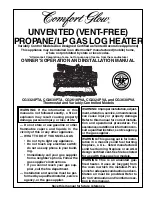
p.
15
©Aqua-Hot®
600D and 675D Use and Care Guide
Appendices
Appendix A: Antifreeze Types
The following information addresses the necessary
usage of propylene glycol based “boiler” type antifreeze in the
Aqua-Hot. Propylene glycol is a safer alternative to the more
toxic ethylene glycol antifreeze; however, as mandated by the
International Association Plumbing and Mechanical Officials
(IAPMO,) only propylene glycol based “boiler” type antifreezes
deemed “Generally Recognized As Safe” (GRAS) by the FDA
should be utilized.
Due to the significant impact of various types of anti-
freeze on a hydronic heating system, including the level of
safety provided, it has been recognized that there is a need to
provide an explanation regarding two additional prominent
types of antifreeze/coolant available. The following infor-
mation should be utilized as an educational means of ensur-
ing that the proper type of propylene glycol based antifreeze is
selected.
RV & Marine Antifreeze
These types of propylene glycol based antifreeze
products are formulated specifically for “winterizing” applica-
tions ONLY. Although RV and Marine antifreeze is often GRAS
approved by the FDA, it should never be used in the Aqua-
Hot’s Hydronic Heating System. This type of antifreeze is not
formulated to transfer heat, which is essential to the heating
system’s functionality and does not contain rust inhibitors.
Please note that RV and Marine antifreeze can be utilized to
winterize the Aqua-
Hot’s domestic water coil for extended stor-
age periods.
Automotive Antifreeze/Coolant
These types of propylene glycol based antifreeze
products are formulated specifically to protect automotive
engines against corrosion, freezing temperatures, and over-
heating. They also have excellent heat transfer and thermal
conductivity characteristics. Although these types of antifreeze
products are considered less toxic and safer than ethylene
glycol for people, pets, and the environment, they are not
GRAS rated by the FDA. Therefore, they must be marked with a
“harmful if swallowed” warning. This additional warning is re-
quired because these types of antifreeze products contain
high levels of chemical rust inhibitors. Due to their potentially
hazardous properties, they should never be used in an Aqua-
Hot heating system.
Appendix B: Antifreeze Mixture Water Quality
Recommendations
In order to ensure maximum performance and longev-
ity of an Aqua-Hot heating system
’
s boiler tank and associated
components, it has been determined that there is a need to
use distilled, de-ionized, or soft water in combination with con-
centrated propylene glycol for the Aqua-
Hot’s antifreeze and
water heating solution. Please note that this is only necessary
when mixing concentrated propylene glycol antifreeze with
water; suppliers of pre-mixed antifreeze are responsible for
the use of high-quality (distilled, de-ionized, or soft) water
when preparing their antifreeze for sale.
Hard water possesses a high-level of calcium and
magnesium ions, which deplete the corrosion inhibitors in the
propylene glycol. This causes the antifreeze and water heating
solution to begin turning acidic, which can corrode the Aqua-
Hot boiler tank and domestic water coil prematurely, thereby
shortening the operational lifespan of the Aqua-Hot. Therefore,
concentrated propylene glycol should be used with distilled,
deionized, or soft water. The local water agency should have
up-to-date water quality reports which will indicate if the local
tap water is within our guideline of 80ppm of hardness or
less.
Appendix C: Antifreeze Terms and Mixture
Ratio
The following information addresses the process of
selecting a propylene glycol based antifreeze solution that
provides adequate freeze, boiling, rust, and corrosion protec-
tion. A 50/50 mixture ratio is recommended, which will result
in a freeze point of approximately
–
28°F and a boiling point of
approximately 222°F.
The following information should be utilized for the
purpose of clarifying some terms commonly associated with
antifreeze.
Freeze and Burst Point
Antifreeze solution lowers the freezing point of any
liquid to which it has been added by preventing the formation
of crystals. However, as the ambient temperature continues to
decline, the water in the solution will attempt to attain a solid
state. The point at which the water begins to solidify (or “gel”)
is termed as the “freeze point.” Although the water in the solu-
tion has begun to freeze, producing a “slushy” consistency,
Содержание 675-D
Страница 1: ...USE AND CARE GUIDE 600SERIES 600D and 675D with...
Страница 2: ......
Страница 20: ...Section Title 18 Aqua Hot 600D and 675D Use and Care Guide Service Log DATE SERVICE PERFORMED SERVICE CENTER...
Страница 21: ...p 19 Aqua Hot 600D and 675D Use and Care Guide DATE SERVICE PERFORMED SERVICE CENTER Service Log...
Страница 23: ......








































